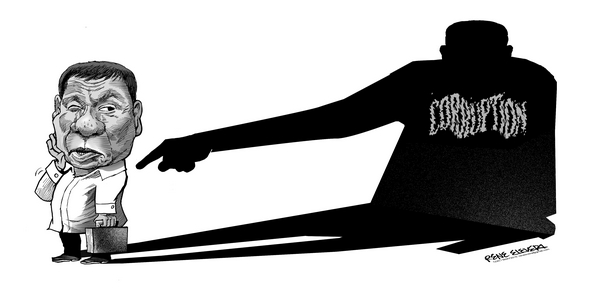
Though President Rodrigo Duterte had been less emphatic about his commitment to eradicating corruption within government in favor of his daily diatribes against illegal drugs, there is no mistaking his abhorrence for corruption in public office and two cases showed just how graft still exists even within his administration.
The first involved an investigation into the excessive travels of PhilHealth chief Ma. Jude dela Cerna who accumulated P627,293 in travel expenses for one year despite the agency losing P8.92 billion in income.
Travel expenditures had become the President’s pet peeve after he ordered the sacking of Marina administrator Marcial Amaro III last January and Terry Ridon, former chairman of the Presidential Commission for the Urban Poor the year before.
But while the President can fire Cabinet level officials anytime he wants to, the same cannot be said for elected officials especially those in the barangay level and Sangguniang Kabataan (SK) who can get sponsorships for their so-called Lakbay Aral trips.
They would have to undergo grilling at either the City Council or the Provincial Board (PB) provided that someone is brave, patient and lucky enough to file a complaint either to them or to the Office of the President, who will then order the Department of Interior and Local Governments (DILG) to conduct an investigation into these erring officials.
These checks, despite being available, don’t deter either elected and appointed officials from using public funds as they deem fit which are often contrary to the law or in this case the Anti-Graft and Corrupt Practices Act.
But while dela Serna may be penalized for her excessive travels, it remains to be seen whether just resigned Tourism Secretary Wanda Tulfo-Teo will be sanctioned amid reports on the P60 million worth of advertising contracts from the Department of Tourism (DOT) that the People’s Television Network Inc. issued to Bitag Media Unlimited Inc., a media outfit owned by Teo’s brother Ben Tulfo.
Though Bitag Unlimited returned the P60 million to the DOT as a “show of good faith” as stated by Teo’s lawyer Ferdinand Topacio, the incident stained public perception of the agency as it created an impression of conflict of interest and undue influence by those clearly identified with or allied with the administration.
It remains to be seen if an investigation into this case is forthcoming.
Yet these two cases should be followed through and the principals made to account for their actions lest public faith and confidence in government, fragile as it is now, is further eroded.